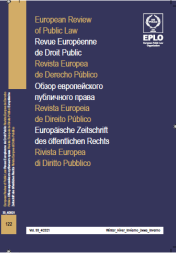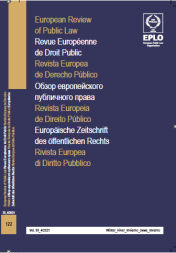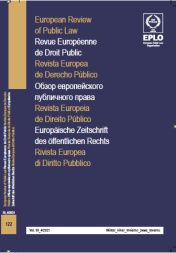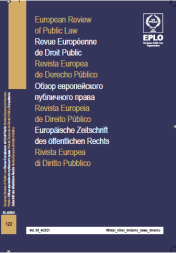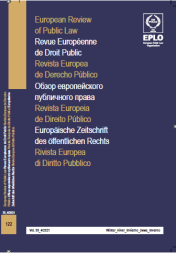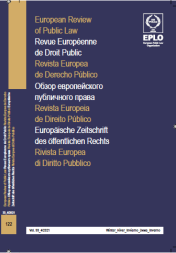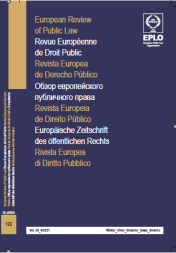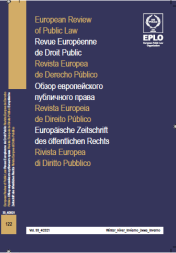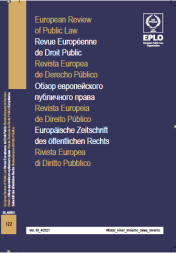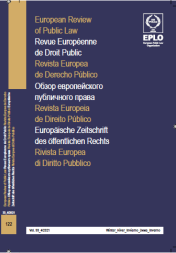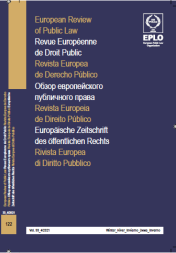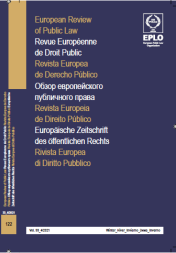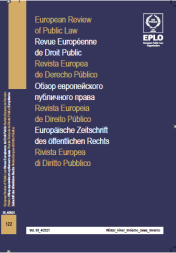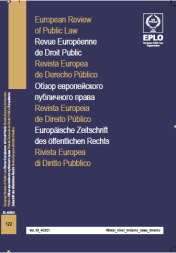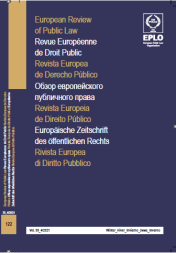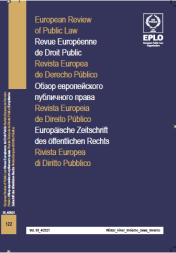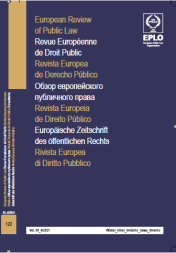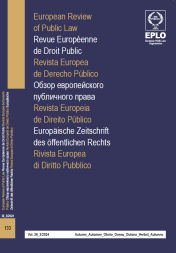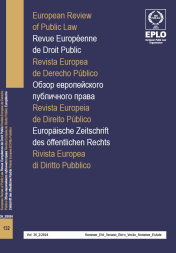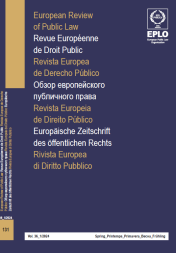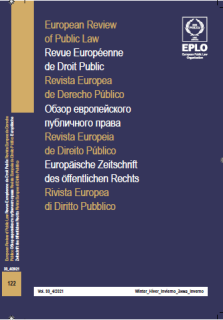
ERPL
vol. 33, no. 4, winter/hiver 2021 (122)
Once again, a large part of the papers in this ERPL issue are devoted to or affected by the COVID-19 crisis and the measures taken to combat it.
In the section of Articles, this ERPL issue starts by an article which aims to thoroughly sketch the educational objectives, strategies, and assessment procedures put in place by the Hellenic National School of the Judiciary while training future or newly-appointed national judges in EU law. The article presents the use of specific learning techniques (Blocking and Interleaving learning techniques) during the training phase, the two cycles of relevant training, the key training strategy (“learning through participation in teaching”), and finally, a novel method for the assessment of the trainees’ performance.
The next article analyzes how the Albanian legislation treats the role of the media in elections, compared to international requirements and standards and EU legislation. A quantitative assessment, based on the perceptions and assessment of domestic and international observers, of the level of implementation of legislation that addresses the role of the media in the election campaign is also the object and purpose of this study.
Last but not least in the section of Articles, the purpose of the following article is to investigate the potential uses of distributed ledger technologies (“DLT”) such as blockchain in public administration, and includes an overview of the state of global blockchain initiatives as well as an outline of the benefits and challenges of institutional complexities, based on inspiring proof of concepts of governmental blockchain initiatives.
In the section of Chronicles of Constitutional Law, the chronicle coming from Greece starts with a reference to the benefits and the shortcomings of the reformation of Greek Family Law that took place in 1983, which was, however, followed by a legislative inaction in the intervening period of nearly four decades. This inaction was eventually interrupted by Law 4800/2021, which purported to remedy the shortcomings of the law of the 1980s in relation to children brought up outside wedlock, and to attune Greek Family Law to the provisions of the 1989 United Nations Convention on the Rights of the Child that proclaims the best interest of the child as the core, fundamental principle for any decision affecting it.
The chronicle on Hungarian Constitutional Law introduces the most important occurrences in Hungarian constitutional law for 2021. The National Assembly did not amend the Fundamental Law, however the Ninth Amendment remained a focal point of relevant academic inquiry in the terms of many of the provisions regarding special legal order. Also in this context, the jurisprudence of the Hungarian Constitutional Court has been enriched by a variety of cases reflecting on certain measures taken to battle the COVID-19 pandemic and impose vaccination restrictions on certain specific sectors of employment.
The Constitutional Law chronicle coming from Romania presents the measures adopted in 2020-2021 in the context of the COVID-19 pandemic, which affected society and the legal system as a whole, and also, in a different register, those aimed at justice, meaning dialogue and relations between national and supranational courts and it analyzes both dimensions.
The following chronicle on Constitutional Law, coming from Serbia, analyzes in detail the adopted major constitutional reforms in regards to the judicial sector, affirmed by a citizens’ referendum of January 16, 2022, in the light of the Serbian EU Accession Process. It maintains that the real effect of the Serbian constitutional amendments in regards to the judiciary, which on paper represent a step forward towards the strengthening of judicial independence and rule of law in Serbia, will largely depend on the political will to adhere to the wording of the Constitution in practice.
The Constitutional Law chronicle coming from Spain focuses on the legal responses to the challenges of the Covid-19 pandemic, which were structured through the application, on the one hand, of the constitutional law of exception contained in Article 116 Spanish Constitution and its implementing legislation; and on the other hand, that of ordinary health law. Likewise, in 2020, for the first time in the history of the recent Spanish democracy, two electoral processes were suspended, specifically the elections to the Parliament of Galicia and to the Parliament of the Basque Country. Finally, as concerns the activity of the Constitutional Court, ATC 40/2020 of April 30, is emphasized.
In the section of Chronicles of Administrative Law, the first chronicle, coming from Germany, deals with the activity of the Federal Administrative Court which, in 2021, chiefly rendered decisions regarding the fields of building and asylum law. In addition, it clarified specific questions outside the scope of the issues which regularly reach the Court, such as requirements needed for the preimplantation diagnosis of an embryo as well as the prerequisites which allow domestic intelligence services to monitor an individual associated with an anti-constitutional organisation.
The second chronicle examines such developments as: a package of acts passed in 2021 in Finland that would transfer the responsibility for organizing social and health care from municipalities to new self-governing units, the wellbeing services counties (hyvinvointialue); the case-law of courts and the practice of highest legal supervisors, the Parliamentary Ombudsman and the Chancellor of Justice, on which the COVID-19 crisis has been reflected; and public procurement and university entrance examinations.
The third chronicle outlines the development of administrative law in Greece during 2020 through important court decisions and significant laws. It starts with Law 4727/2020 on Digital Governance - Electronic Communications; it continues with Law 4683/2020 on the enactment of the Act of Legislative Content of 20.3.2020 “Urgent measures to address the consequences of the risk of spreading COVID-19, to support society and entrepreneurship and to ensure the smooth operation of the market and public administration” and other provisions; then, the adoption of the Rules of Procedure of the Independent Public Revenue Authority is examined. Furthermore, four important decisions are analyzed: on the possibility of acquiring the ownership of public estates and especially of national forests; on the principle of non-retroactivity of laws; on the distinction of administrative disputes of substance from private disputes as a condition for the Jurisdiction of the Courts; and on the administrative contracts and more specifically the competition for the granting of a casino license for a wide range of activities within the Metropolitan Pole of Elliniko-Agios Kosmas.
The fourth chronicle maintains that in 2021 the legislation in Hungary did not significantly affect the field of Administrative Procedure Law, however some amendments were made in order to clarify issues of legal interpretation arising from case law: One was that when the legislator has clarified who is entitled to decide on the disqualification of an authority if there is a ground for exclusion against the authority. On 1st of January 2021, the Act on Sanctions for Administrative Infringements came into force, with which the legislator sought to unify the extensive substantive administrative sanctions legislation. Finally, the main principles of a couple of interesting court (nullity of an administrative act, judicial independence) and Constitutional Court (the right of nationalities to use languages in administrative litigation) decisions issued during the year are presented.
The following Administrative Law chronicle, coming from Poland, emphasizes that, despite the restraint on scientific activity due to the COVID-19 pandemic, the 11th Scientific Conference of Administrative Law Scholars of Cracow and Wrocław was organized online. In the field of legislation, some institutions, the introduction of which was linked to the necessity to create legal frameworks for combating the pandemic and managing its consequences, were presented, as well as two decisions of the High Administrative Court, of primary importance for the implementation of Administrative Law in Poland.
The sixth Administrative Law chronicle, coming from Serbia, covers developments in the Serbian energy sector, seen as the key cause for opening Negotiating Cluster 4 - Green Agenda and Sustainable Connectivity. The author casts light on the ambitious legislative package, comprising amendments to acts in place or the adoption of completely new legislation that in its entirety aims at promoting energy efficiency and sustainability in this important sector. However, recent developments point towards a discrepancy between the normative and the practical realities – urging the imposition of instruments that would ensure the proper implementation of the adopted legislation, of preventive measures and greater citizen involvement in policy making.
The last Administrative Law chronicle is devoted to the agenda of the Spanish basic, state and administrative legislator which has been marked, unfortunately, by COVID or by its tragic consequences, on a human level as well as on an economic level. Fortunately, as the pandemic has lessened its intensity in recent months, Spain’s legislator has taken the time and opportunity to include in the above-mentioned agenda other laws (more than twenty) that have little or nothing to do with COVID and its consequences. In the author’s opinion, among these laws should be emphasized: Law 7/2021, of 20 May, on climate change and energy transition; and Organic Law 3/2021, of 24 March, on the regulation of euthanasia.
This Chronicles section of this ERPL issue concludes with the review of an interesting book (in German), which studies the institutions of public authority organization in four ancient legal orders, namely ancient Egypt, the Kingdom of Assyria, ancient Athens, and Rome, over time and over space.
This ERPL issue is concluded by an Analytical Table of the contents of all four ERPL issues of the year 2020.
Summary
N. K. Markopoulos, EU Law Training at the Hellenic National School of the Judiciary. Objectives, Methods, and Practices [IN ENGLISH] (14 pp.)
A. Kume, Comparative Analysis of Albanian Law and International Standards on Media and Election [IN ENGLISH] (20 pp.)
R. Onufreiciuc / L.-E. Stanescu, Blockchain Use Cases in the Public Sector [IN ENGLISH] (34 pp.)
Chronicles
I. Constitutional Law
A. I. Pottakis, Greece [IN ENGLISH] (18 pp.)
M. Sulyok / D. Márki, Hungary [IN ENGLISH] (24 pp.)
M. Safta, Romania [IN ENGLISH] (23 pp.)
T. Miljojkovic, Serbia [IN ENGLISH] (23 pp.)
F. M. García Costa, Spain [IN SPANISH] (25 pp.)
II. Administrative Law
M. Brenner / D. Wunderlich, Federal Republic of Germany [IN GERMAN] (33 pp.)
K. Kuusikko, Finland [IN ENGLISH] (17 pp.)
M.-E. Ioannou, Greece [IN ENGLISH] (28 pp.)
Cs. Molnár, Hungary [IN ENGLISH] (18 pp.)
J. Człowiekowska, Poland [IN FRENCH] (18 pp.)
B. Todorović, Serbia [IN ENGLISH] (24 pp.)
L. F. Maeso Seco, Spain [IN SPANISH] (53 pp.)
E. N. Iliadou [IN ENGLISH] (3 pp.)
Analytical Table (3 pp.)















